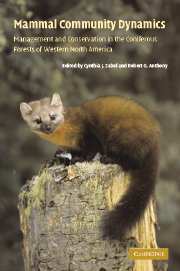 Mammal Community Dynamics
Mammal Community Dynamics Published online by Cambridge University Press: 15 December 2009
The ecological knowledge needed to achieve the goals of ecosystem management will not be limited to understanding the influence of habitat manipulations on desired mammal populations; it will also include an understanding of how those mammals contribute to the functioning of the ecosystems they occupy. Examples of the significant influence that mammals may have on the structure and function of ecosystems include the effects of sea otters (Enhydra lutris) on the community structure of coastal marine ecosystems (Estes and Palmisano 1974), the effects of American beavers (Castor canadensis) on the hydrology and ecology of temperate riparian ecosystems (Naiman et al. 1986, Anthony et al. 2003), the effects of burrowing mammals on soil fertility and stability (Meadows and Meadows 1991, Ayarbe and Kieft 2000), and the effects of large ungulates on successional processes and the structure of plant communities in a variety of ecosystems (Hobbs 1996). Each of these species or species groups has been described as a potential keystone species (Mills et al. 1993) in the ecosystems they occupy. Because most species of mammals may not influence ecosystem processes to the extent that keystone species do, their ecological contributions are often overlooked. We propose, however, that the collective importance of terrestrial mammals to ecosystem structure and function is substantial and that the decline or loss of forest mammal species could have detrimental effects on ecosystem diversity, productivity, or sustainability.
To save this book to your Kindle, first ensure [email protected] is added to your Approved Personal Document E-mail List under your Personal Document Settings on the Manage Your Content and Devices page of your Amazon account. Then enter the ‘name’ part of your Kindle email address below. Find out more about saving to your Kindle.
Note you can select to save to either the @free.kindle.com or @kindle.com variations. ‘@free.kindle.com’ emails are free but can only be saved to your device when it is connected to wi-fi. ‘@kindle.com’ emails can be delivered even when you are not connected to wi-fi, but note that service fees apply.
Find out more about the Kindle Personal Document Service.
To save content items to your account, please confirm that you agree to abide by our usage policies. If this is the first time you use this feature, you will be asked to authorise Cambridge Core to connect with your account. Find out more about saving content to Dropbox.
To save content items to your account, please confirm that you agree to abide by our usage policies. If this is the first time you use this feature, you will be asked to authorise Cambridge Core to connect with your account. Find out more about saving content to Google Drive.